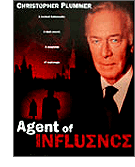
AGENT OF INFLUENCE
Canada, 2002, 98 minutes, Colour.
Christopher Plummer, Marina Orsini, Ted Whittall, Shaun Johnston, Alain Goulem.
Directed by Michel Poulette.
Agent of Influence is based on a book by Ian Adams and Riley Adams, tracing the history of Canadian ambassador John Watkins and his fall from grace in the 1960s. His death was covered up by authorities until these authors discovered the truth of what happened to him. This film is a dramatisation of events in 1964 leading up to the ambassador’s death.
The 1964 setting is important. Lester Pearson was prime minister in Canada, sympathetic to interactions with the Soviet Union and building up trade relationships, with the help of his ambassador. However, the American government and the CIA saw him as too leftist-leaning and sympathetic to communism and, as with so many other regimes, tried to smear him. By ruining the reputations of his officials, they hoped to bring about his downfall.
John Watkins is played by Christopher Plummer at his best, a strong and dignified performance, a man who was able to move in the highest circles and is dismayed by the accusations against him as well as his forced internment in a hotel.
The film shows something of his background, his work in Russia, the influence he had at the behest of his government, criticisms of the Americans and their antipathy towards him. He was also a homosexual but discreet in his behaviour. However, this was used against him. The CIA, especially through Robert Madison (played by Ted Whittall with smile and sneer) and pressure on the Royal Canadian Mounties and their police investigations. There are scenes of interrogations, pressure from Madison, implications of the Royal Mounted Police – and a traitor within their midst.
The interrogation is placed under the command of Mountie Diane Fletcher, unusual for a woman to be in this position and her wanting to prove herself. However, she and her brother, who also worked in espionage, have been dismayed by the suicide death of their father, a friend of John Watkins. She is determined but gradually realises that she is being used and that the ambassador is innocent.
Made in 2002 and released before the invasion of Iraq, the film shows the CIA and its pressures in a very bad light. This was to be reinforced by the Bush administration and the discussions about weapons of mass destruction in Iraq. Later exposes mean that this film is a very relevant film even though it dramatises events of forty years earlier.
1.A true story, a perspective on the Cold War, on the United States, government and CIA, the Royal Canadian Mounted Police, Canadian politics?
2.The information about John Watkins, his friendship with Lester Pearson, Lester Pearson as Prime Minister of Canada, the friendship, diplomacy, the trade agreement success? The American attitude to Pearson, seeing him as left-leaning? Other diplomats, exposes, scandals, suicides? Government cover-ups?
3. The Russian settings, France, Canada? The period?
4.The title, its technical meaning in the world of espionage?
5.Christopher Plummer as John Watkins, age, gravitas? The visit with the professor, the professor trying to turn Watkins and Watkins’ reply? The encounter with the gypsies? Work, meeting Gromeko, the discussion about the New York Times article, the anti-American attitudes, the planting of the article by the CIA? The American ambassador? Watkins and his staff?
6.Diane and Murray Fletcher, the death of their father, the meeting, scattering his ashes? The events, the clash between brother and sister, blame? Diane and her kayaking with her father, his going into the rapids, his death? Blaming herself?
7.The CIA sequences, Langley? The visit of the mounted police officers? The discussions with the head of the CIA? The introduction of Madison? Protocols, the giving of information, pursuing suspicions, discussions? The targeting of Watkins and the reasons?
8.The mounted police authorities, David Present and his role? Diane Fletcher and her being given the job? Her eagerness and ambition?
9.Robert Madison, the history of his activities in Africa, the death of Lumumba, Egypt? The reports? His interrogation techniques, torture? His brash manner? Attitude towards Watkins? The parameters of interrogation, his making advances on Diane Fletcher? Cruelty, lies? His influence?
10.Present, his role in the police, espionage, interrogations, harsh? The revelation that he was covering the truth about himself? The end, his arrest, his defiance towards Diane Fletcher, her interrogating him officially?
11.John Watkins and the warning, the surveillance, the hotel, at the desk, the car, his being taken, taken to the hotel room, isolated? His reaction, the humiliation, his anger? His words to the interrogators?
12.The nature of the interrogation, spies, talking about officials being turned, the presumption of guilt? His relationships, sexuality, discretion? His relationship with the poet, the incriminating photos – and the flashbacks showing their innocence?
13.The poet, his past, the arrest, tortured, killed, the false evidence? The visualising of this?
14.Diane Fletcher and her hesitations, her reactions to Madison, to Present? The warnings from her brother? The discussions with Watkins, her finally wanting to help? His comments about her father, his pride and the way that he died?
15.Watkins and his heart condition, the tablets, his playing the piano? His self-assertion? The irony of talking about the dinner with friends? Madison threatening him and holding him over the balcony, withholding his pills? Madison’s smooth talk about this? Watkins collapsing and dying? The information given out about his dying with friends at dinner?
16.Diane and Murray talking, the truth, the father and his death, the flashbacks?
17.The role of the CIA, people like Madison, power, ruthlessness, alleged patriotism?
18.Diane Fletcher deciding to stay with the police, her work with Present?
19.The cover-up for a long time, The revelation of the truth? The relevance of this 1960s episode to the 21st century?